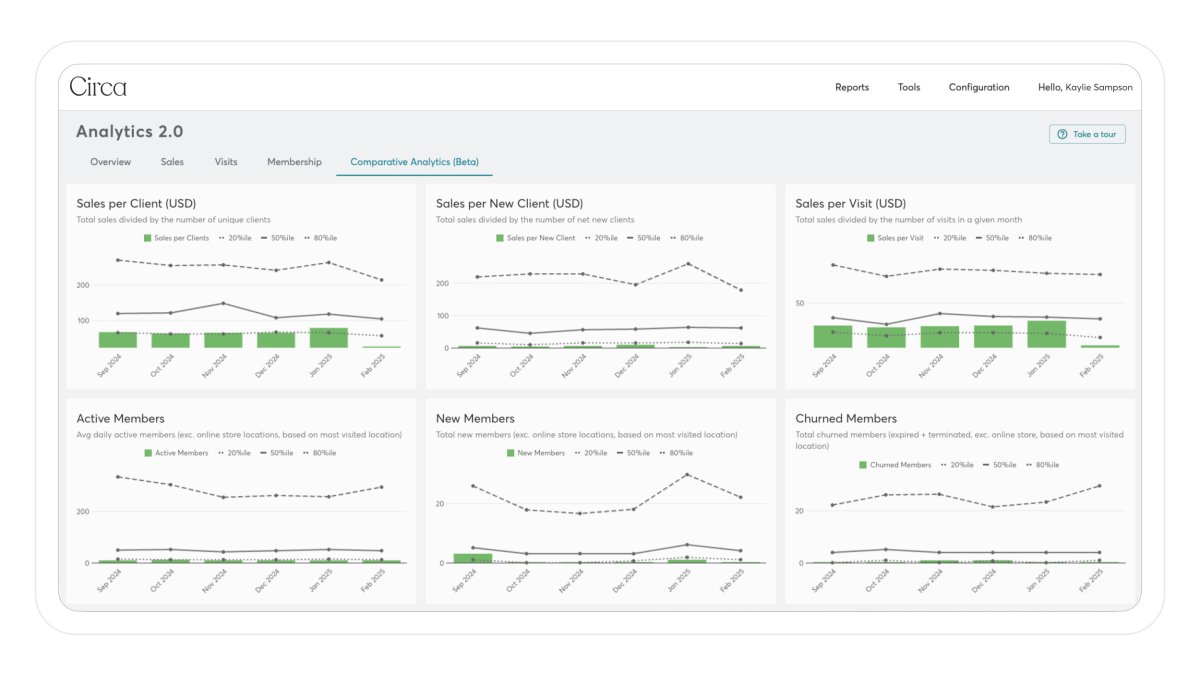
The last 50 years have not been so kind to small businesses. A wave of corporate mergers and subsequent shifts in economic policies have allowed large corporations to dominate the marketplace, all while small business owners have struggled to stay afloat as competition melts away.
But in 2025, generative AI may be offering the little guys a life raft.
Suddenly armed with the ability to reach larger audiences, to narrowly tailor their marketing and communications and to insource their finances, small businesses are now finding themselves with a fighting chance against big businesses. Those capabilities have given small retailers a boost against industry giants, but small service providers in the wellness space are still looking for ways to break through in a sector that has ballooned over recent years.
Mindbody, a booking platform for fitness, beauty and wellness experiences, is angling to be the AI answer that those companies are looking for.
Over the last two years, Jacob Meacham, the company’s chief technology officer and head of engineering, has lead “a pretty major thrust” to refine Mindbody and ClassPass’ approach to machine learning. Mindbody, which boasts 2.8 million active users, also owns ClassPass, a fitness subscription platform with over 2 million users.
“We’ve taken a much more AI-informed lens and are helping parse that data for our customers directly,” Meacham told Newsweek in a Tuesday interview.
Photo-illustration by Newsweek/Getty/Canva
There are two types of analytics that businesses can access through Mindbody. The platform uses individual data to help businesses identify trends, like client retention risk or top spenders. By surfacing what Mindbody refers to as “clients at risk,” businesses can proactively find ways to prevent those customers from churning. These analytics also helps businesses focus on clients who would be likely to stick around.
Mindbody’s other analytic mode uses aggregated data from more than 30,000 businesses to power comparative analytics, giving businesses the opportunity to benchmark against their peers on metrics like class occupancy, repeat client rates and revenue. For example, a yoga studio in a downtown area of a mid-sized metro area could see how its business stacks up against others that provide similar services in similar settings.
“Data is the ingredient that makes that magic potion work,” Meacham said. “Without having the huge network of businesses that we have, you can’t really build that type of feature.”
Barry Moltz, a small business expert, told Newsweek that Mindbody’s capability is “critical” to small fitness, beauty and wellness businesses not only because it gives their customers the convenience of being able to book appointments online but because it also tracks what customers are participating in, who they’re participating with and what products they’re buying.
“Years ago, small business owners didn’t have the time, didn’t have the skills or didn’t have the tools to analyze their customer data,” Moltz said on Thursday. “Now with AI, if you ask the right questions, it can do it for you.”
Last year, Mindbody launched its AI assistant, offering businesses a 24/7 digital support expert that could answer questions about software, troubleshooting and feature navigation. The company has reported a decrease in support interactions and shorter issue resolution times as a result of the implementation.
Kristin Kidd, the chief operating officer of Head to Toe Brands, called Mindbody’s analytic tools “a game-changer” for businesses. Head to Toe Brands is a franchisor of beauty salons, including The Lash Lounge, a lash and brow business that has used Mindbody since 2018.
“Every business operates a little differently, so standard legacy reports aren’t always a perfect fit,” Kidd told Newsweek.
When Mindbody released its analytic tools, it not only gave Head to Toe Brands “a systemwide view of performance” but also empowered individual salon owners of their franchises “with access to their own data,” Kidd said.
“The ongoing rollout of new views in the portal has been really helpful. We’re a data-driven business, and our franchisees love digging into their numbers to make decisions that fuel growth. You just can’t do that without accurate, real-time data,” she added.
Kidd said before Mindbody launched its AI capabilities, business owners were forced to do a lot of manual data sorting to access the insights they were looking for.
“Now, with their AI chatbot, getting support has become a lot more intuitive,” she said. “Instead of searching through help articles, you can just ask the bot what report shows a certain data set, or how to complete a task—like adding a service, checking someone out or viewing a client’s info. It’s incredibly helpful and feels very natural to use.”

Mindbody
Kidd isn’t the only one who finds Mindbody’s AI capabilities to be helpful. Currently, 90 percent of the platform’s enterprise clients use their analytic tools.
“Over my time here, I have seen the industry get more sophisticated,” Meacham, who first joined ClassPass seven and a half years ago, said. “There are more businesses that are interested in additional value that can be applied to their business, whether that’s through marketing tools or reporting and analytics or other tools, AI or otherwise, that we offer.”
Nearly 89 percent of small business owners indicate that someone at their business currently uses AI tools, according to a February report from the Initiative for a Competitive Inner City. Over 60 percent of business owners who said they use AI report that they have seen positive changes in employee job satisfaction and productivity as a result of their AI adoption.
The most popular AI used among small business owners? Data analysis.
“I don’t think there’s anything more important than being able to analyze who your customers are and what they do in relationship to your business,” Moltz said, adding, “You can use all that rich data to remarket to those customers and to service them better.”
ClassPass has also adopted AI capabilities. SmartTools predicts unfilled classes or appointment spots to help businesses maximize their revenue. Factoring in variables like the time of day, demand trends and historical patterns, SmartTools finds the “right” rate to fill empty spots without undercutting direct business.
Businesses that integrated their schedule with SmartTools saw a 100 percent increase in their ClassPass revenue last year, with enterprise partners reporting a 50 percent revenue increase within six months, according to the platform. The AI tool also increased first-time visitors to ClassPass partners by up to 100 percent and improved average fill rates by 14 percent in 2024.
Now, Meacham is going all in on predictive analytics.
He wants Mindbody’s AI to not only analyze a customer’s history but to use it to find out where the business is going next. He wants ClassPass’ AI assistant to evolve into an AI agent that can go beyond answering questions to take on the role of a strategic advisor. To him, that means the AI would be able to take a user’s travel information—everything from hotel bookings to excursion itineraries—and come up with a list of local businesses that the user might like and that have availabilities matching up with the user’s schedule.
Meacham recognizes that the AI space is moving fast. That’s why Mindbody has established an internal AI Council focused on responsible AI use, with privacy, accuracy and human oversight in mind.
“We are trying to stay as close to the forefront as we can,” he said. Mindbody is “really thinking about how to make sure these tools are—at their core—centered around use cases that our customers really have and that they are valuable tools and assistance, as opposed to something overwhelming.”
